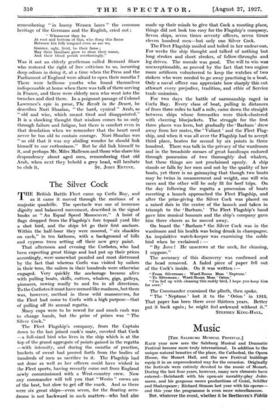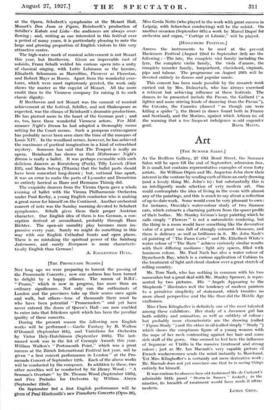Music
THE SALZBURG MUSICAL FESTIVAL.] EACH year now sees the Salzburg Musical and Dramatic Festival become more truly international. In addition to the unique natural beauties of the place, the Cathedral, the.Opera House, the Mozart Hall, and the new Festival buildings equip it in an unprecedented way for the occasion. Originally the festivals were entirely devoted to the music of Mozart. During the last four years, however, many new elements have entered—Reinhardt with his open-air morality-play Jeder- mann, and his gorgeous rococo productions of Cozzi, Schiller and Shakespeare; Richard Strauss last year with his operas—. and this year the programme is even more miscellaneous.
But, whatever the event, whether it be Beethoven's Fidelin
at the Opera, Schubert's symphonies at the Mozart Hall, Mozart's Don Juan or Figaro, Reinhardt's production of Schiller's Kabcde and Liebe—the audiences are always over- flowing ; and, writing as one interested in this festival over a period of many years, it is particularly pleasing to note the large and growing proportion of English visitors to this very attractive centre.
The high-water mark of musical achievement is not Mozart this year, but Beethoven. Given an impeccable cast of soloists, Franz Schalk welded his curious opera into a unity of classical singing, with Lotte Lehmann as the heroine, Elisabeth Schumann as Marcelline, Piccaver as Florestan, and Robert Mayr as Rocco. Apart from the wonderful over- tures, which were most rapturously greeted, the work only shows the master as the copyist of Mozart. All the more credit then to the Viennese company for raising it to such classic dignity.
If Beethoven and not Mozart was the summit of musical achievement at the festival, Schiller, and not Shakespeare as expected, was the climax of Reinhardt's dramatic productions. He has pierced more to the heart of the German poet ; and so, too, have these wonderful Viennese actors. For Mid- summer Night's Dream he had adopted a thoroughly rococo setting for the Court scenes. Such a pompous extravagance has probably never been seen since the time of the masques of Louis XIV. In the woodland scenes, however, he has achieved the maximum of poetical imagination in a kind of cobwebbed mystery. Someone has said that The Tempest is really an opera. Reinhardt has shown us that Midsummer Night's Dream is really a ballet. It was perhaps excusable with such delicious dancers as Kreutzberg (Puck), Tilly Loesch (First Elf), and Maria Solveg (Titania) that the ballet parts should have been somewhat long-drawn ; but, national bias apart, it was an error to make the parts of Lysander and Demetrius so entirely farcical as Hans and Hermann Thimig did.
The exquisite dancers from the Vienna Opera gave a whole evening of ballet with the Vienna Philharmonic Orchestra under Paul Kerby, a young English conductor who is making a great name for himself on the Continent. Another orchestral concert of note was the Sunday morning devoted to Schubert symphonies. Schalk gives them their proper Austrian character. Our English idea of them is too German, a con- ception derived at secondhand, probably through Hans Richter. The open-air morality play becomes more im- pressive every year. Surely we might do something in this way with our English Cathedral fronts and open places. There is no mistaking the spiritual power of the Salzburg Jedermann, and • surely Everyman is more characteris-



































 Previous page
Previous page